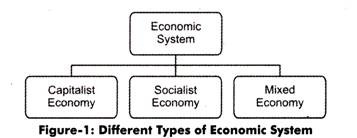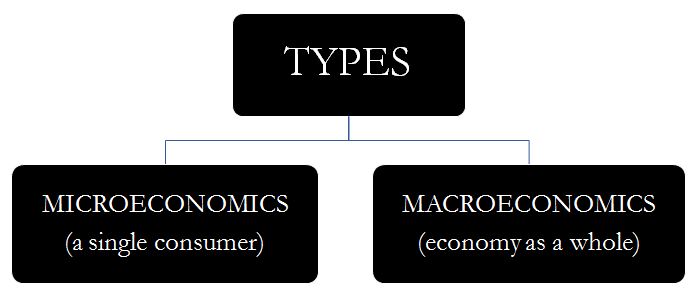Economy and Economics
Economy refers to a geographical area’s or country’s economic condition, status, and activities. Economics, on the other hand, is a subject concerned with the efficient utilization of available resources.
Define Economy and Economics
The economy is defined as the sum of all arrangements for the production, distribution, purchase, consumption, and exchange of goods and services, as well as employment, in a society or nation. There are three types of economies:

- Capitalist Economy: In a capitalist economy (or free market economy), all production factors are owned and controlled by private individuals for profit. The foundation of the capitalist economy is private property, and the profit motive drives it.
- Socialist Economy: The factors of production in a socialist economy are collectively owned and controlled by the community, as indicated by the State. In this economy, a central planning authority decides how resources are distributed among members of the community.
- Mixed Economy: A mixed economy is a combination of a capitalist and a socialist economy in which both markets and the government decide how resources are allocated. A mixed economy contains a system that has characteristics of both a controlled economy and a market economy, and thus the public and private sectors coexist in this type of economy.

Economics is an organized body of knowledge that studies the behavior and activities of an individual, firm, or nation that are related to maximizing the satisfaction of wants or advancing welfare and economic growth through optimum production, distribution, consumption, and exchange of scarce resources that have alternative uses. There are two branches of economics:

- Microeconomics: The branch of economics that studies the behavior and actions of individual economic agents, such as a person, households, businesses and industries. It analyses specific aspects of the economy.
- Macroeconomics: The branch of economics that studies broad economic issues such as economic growth, unemployment, trade balance, poverty, the standard of living, inflation, and so on. It analyses the entire economy.
- Latitudes and Longitudes
- Panchayati Raj System In India
Economy and Economics Difference
Look at the table given below for economy and economics differences:
| BASIS FOR COMPARISON | ECONOMICS | ECONOMY |
|---|---|---|
| Meaning | Economics is the science and art of decision-making, regarding the use of scarce resources, under the conditions of scarcity, to attain maximum satisfaction. | When a country or a geographical region is defined in the context of its economic activities, it is known as an economy or economic system. |
| What is it? | Theory and Principle | Practical Application of Economics |
| Determines | How do human beings make decisions when resources are scarce? | How resources are allocated among different members of society? |
| Focuses on | The way in which economic agents behave and interact and how economies work. | The way in which a country’s economic affairs are organized and conducted. |
Is economy and economics the same thing?
The terms, economy, and economics, are related to each but have significant differences between them. Economy is defined as a social domain that stresses the importance of practices, and discourses associated with the production, use, and management of resources and Economics focuses on the actions and interplays of economic agents. It takes into account how choice is made by individuals, families, firms, governments, and nations, concerning the allocation of limited resources, to fulfill their unending wants, in such a way that maximum satisfaction can be derived.
Economy and Economics – FAQs
Q1. What do you mean by the term economy?
Ans. Economy is defined as the sum of all arrangements for the production, distribution, purchase, consumption, and exchange of goods and services, as well as employment, in a society or nation.
Q2. What is the difference between economy and economics?
Ans. Economy and economics differences are given in the above article.
Q3. What are the two main branches of economics?
Ans. Two main branches of economics are microeconomics and macroeconomics. Microeconomics deals with the behavior of individual households and firms and how that behavior is influenced by the government. Macroeconomics is concerned with economy-wide factors such as inflation, unemployment, and overall economic growth.
Source link

